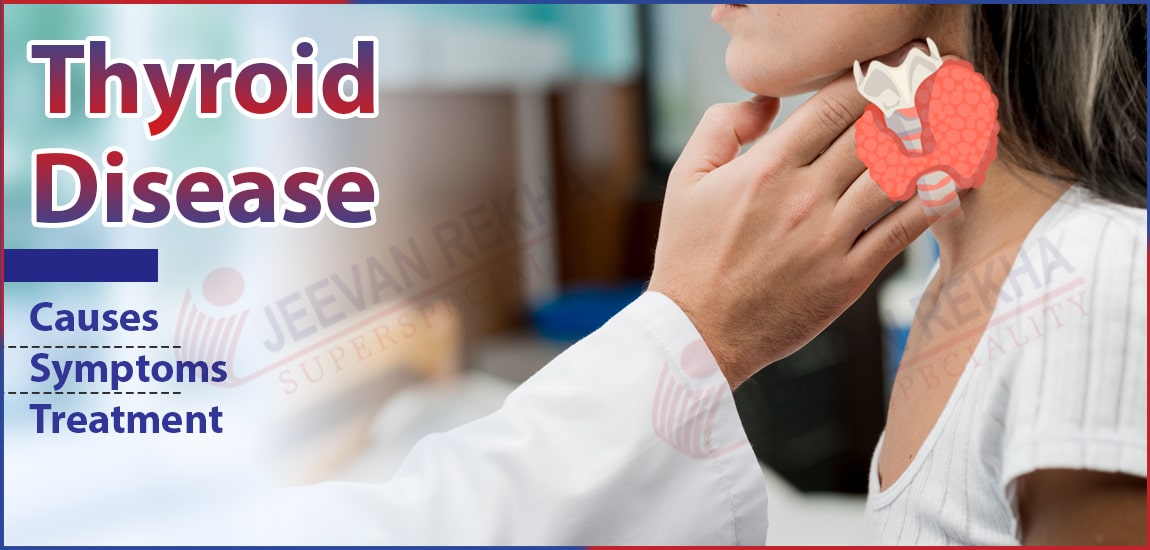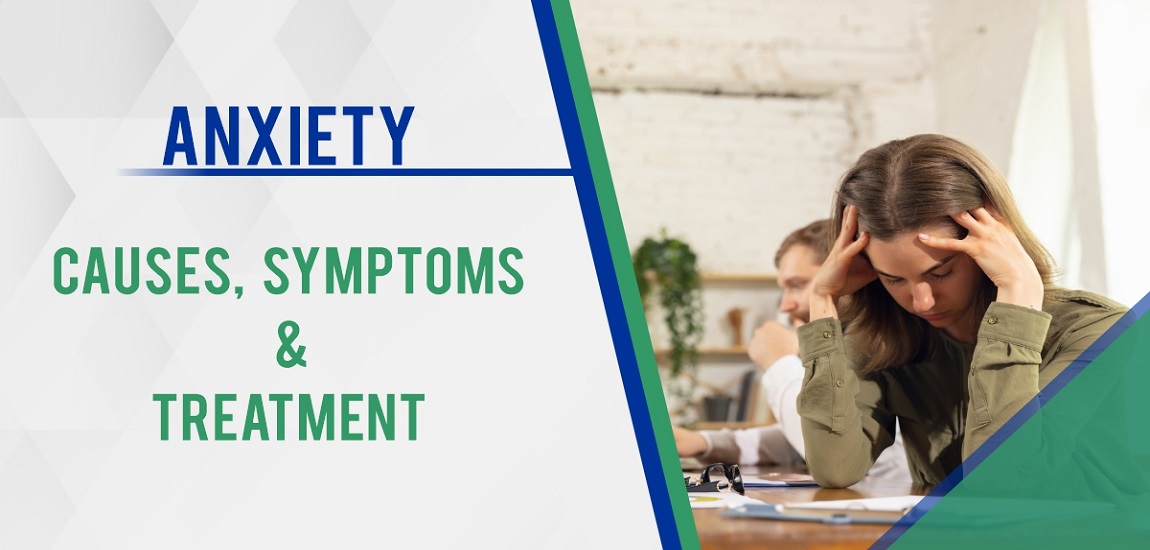
- By Jrsh Admin
- In Health and Tips,
- Posted July 12, 2025
Thyroid Disease: What It Is, Causes, Symptoms & Treatment
Thyroid problems affect millions of people the world over, often silently violating physical and mental well-being. Situated in the neck, the thyroid is a small, butterfly-shaped gland with an enormous role to play in regulating metabolism, energy levels, body temperature, and mood changes.
Hence, when this gland fails to work appropriately, a variety of health problems arise. Really knowing and understanding thyroid disease - its causes, symptoms, and ways to treatment - is necessary for timely diagnosis and proper management.
What Is Thyroid Disease?
Thyroid disease is a disorder affecting the thyroid gland. The gland produces hormones, which include mainly thyroxine (T4) and triiodothyronine (T3), which regulate the way energy is used by the body. Their being ill may generally fall under two main categories:
Hypothyroidism-to mean that the thyroid is underactive and, therefore, does not secrete enough thyroid hormones.
Hyperthyroidism-to mean that the thyroid is overactive and, therefore, secretes too much thyroid hormone.
Other thyroid-related disorders include goiters, thyroid nodules, and thyroid cancer.
Types of Thyroid Disease
1. Hypothyroidism
This is the greatest thyroid disorder in women and happens when the thyroid gland does not produce enough of a hormone due to bodily functions dowsing to slower pace.
Causes:
- One of the main reasons include Hashimoto’s thyroiditis which is an autoimmune disease
- Lack of iodine
- Some medications such as lithium
- Congenital hypothyroidism
- Radiation therapy
Common Symptoms:
- Fatigue
- Weight gain
- Feeling depressed
- Inability to tolerate cold
- Skin dryness
- Constipation you often deal with
- Irregular cycles of menses
- Lowered pulse rate
2. Hyperthyroidism
In contrast with hypothyroidism is an overproduction of thyroid hormones which speeds up the body's processes.
Causes:
- Graves’ disease and thyroid nodules are autoimmune disorders
- Excessive consumption of iodine
- Inflammation of the thyroid – thyroiditis
Common Symptoms:
- Increased perspiration
- Rapid eating in combed with appetite
- Heightened feeling of anxiety
- Increased calorie disposal from the body
- Shift in sleep cycles
3. Goiter
This is abnormal increase of the thyroid gland and like other disorders in this section of the neck , it might not be all that aberrant in the sense of swelling but mark a skill in neck.
Causes:
- Shriveling of the glands of head and neck due to lack of iodine
4. Thyroid Nodules
These are solid or fluid-filled lumps in the thyroid. Some can cause hormone imbalances or cancer, but the majority are benign.
5. Thyroid Cancer
Thyroid cancer is usually curable and comparatively uncommon. It may not cause symptoms at first and frequently manifests as a lump in the neck.
Risk elements:
- Family background
- Exposure to radiation
- Female gender (women are more likely than men to develop thyroid cancer)
You Can Read Also : Arthroscopy Surgery: Procedure, Benefits, and Recovery
What Causes Thyroid Disease?
Several other factors can contribute to thyroid dysfunction, with some families and individuals being more genetically predisposed than their counterparts.
1. Autoimmune Disorders
Autoimmune illnesses like Hashimoto’s and Graves’ disease attack the thyroid, making it either hypo- or hyperactive.
2. Iodine Imbalance
Iodine is vital for the synthesis of thyroid hormones. Excessive amounts or even a mild deficiency of iodine can affect thyroid health.
3. Medications
Some medications, such as lithium and amiodarone, induce some interference with thyroid functioning.
4. Radiation Treatment
Radiation treatment to the head, neck, or chest could damage the thyroid.
5. Genetic Factors
Thyroid ailments are frequently hereditary. Thus, a family history can increase the chances of contracting an ailment similar to that in the near family.
Diagnosis of Thyroid Disease
Usually, a physical examination and a review of symptoms precede a diagnosis, which is then followed by one or more tests:
- TSH (thyroid-stimulating hormone), free T4, and T3 levels are the most frequently performed blood tests.
- Antibody tests are used to identify thyroid autoimmune diseases.
- Ultrasound: Assists in assessing gland size or nodules.
- Thyroid Scan: Examines thyroid activity and structure using radioactive iodine.
- Biopsy: To assess suspected cancer or nodules.
Treatment Options
Depending on what kind and how severe the thyroid disease is, treatment is administered. An early diagnosis makes most treatments more effective.
1. Treatment for Hypothyroidism
Levothyroxine is the standard therapy; this synthetic analog of thyroid hormone T4 is used to restore the hormone levels and relieve symptoms. As a rule, the treatment is life-long and, in the course of the therapy, the specialist reviews and adjusts the dose accordingly.
2. Treatment of Hyperthyroidism
Such treatments include:
- Antithyroid Drugs: These include methimazole and propylthiouracil, which block the synthesis of thyroid hormones.
- Radioactive Iodine Therapy: This destroys overactive thyroid tissue.
- Beta-blockers: These help with symptoms, such as fast heartbeat.
- Surgery: Used in serious situations or if nodules are causing problems.
3. Goiter and Nodules
Treatment depends on their cause. Benign nodules may be followed up, while others may require surgery or radioactive iodine.
4. Thyroid Cancer
Thyroid cancer treatment typically entails surgical removal of the thyroid gland followed by radioactive iodine therapy along with thyroid hormone replacement. With early detection, prognosis is usually excellent.
Living with Thyroid Disease
Managing thyroid disease requires periodic follow-up and certain lifestyle adjustments. Here are some tips:
- Regular Testing: Monitor your hormone levels through thyroid-function testing.
- Medication Adherence: This is very important; a patient should try to take the medication at the exact same time every day.
- Diet and Nutrition: Iodine is among the must-haves in your diet (not too much). Selenium and zinc are also good for the thyroid.
- Mental Health Awareness: It may cause disturbances in mood or cognition, so get appropriate care if you face items of anxiety or depression.
- Exercise: Good physical activity supports weight control and promotes energy.
When to See a Doctor
Unexplained tiredness, weight fluctuations, mood disorders, the swelling of the neck, and menstrual abnormalities—to mention a few—should all call for medical attention. Thyroid-related problems are quite frequent, especially among females and elderly adults, with treatment often being available if identified early.
Conclusion
Thyroid issues can have a significant physical, emotional, and mental impact on your day-to-day life, and we at Jeevan Rekha Hospital in Jaipur are aware of this. For all kinds of thyroid disorders, our devoted team of endocrinologists and medical specialists is dedicated to offering precise diagnosis, individualized care, and ongoing support.
Our all-inclusive thyroid care services can help you at every stage, whether you're dealing with hypothyroidism or hyperthyroidism symptoms, or you're worried about thyroid nodules or cancer. To assist you in taking back control of your health and wellbeing, we employ cutting-edge diagnostic technologies and evidence-based therapies.
Don't wait if you or a loved one is experiencing unexplained fatigue, changes in weight, mood swings, or neck swelling. An early diagnosis can have a profound impact.
Tags
Blog Search
Latest Posts
-
Skin Ulcers Uncovered: Causes, Types, Symptoms, and Healing Options
January 13, 2026 -
Is Coconut Water Safe During Pregnancy? Benefits, Risks & Myths
January 08, 2026 -
Dark Circles Under The Eyes: Causes, Home Remedies and Treatments
December 21, 2025 -
बर्ड फ्लू के लक्षण, कारण, उपचार और बचाव के उपाय जानें
December 04, 2025 -
Best Diet Plan for Menopause Weight Management
November 25, 2025




